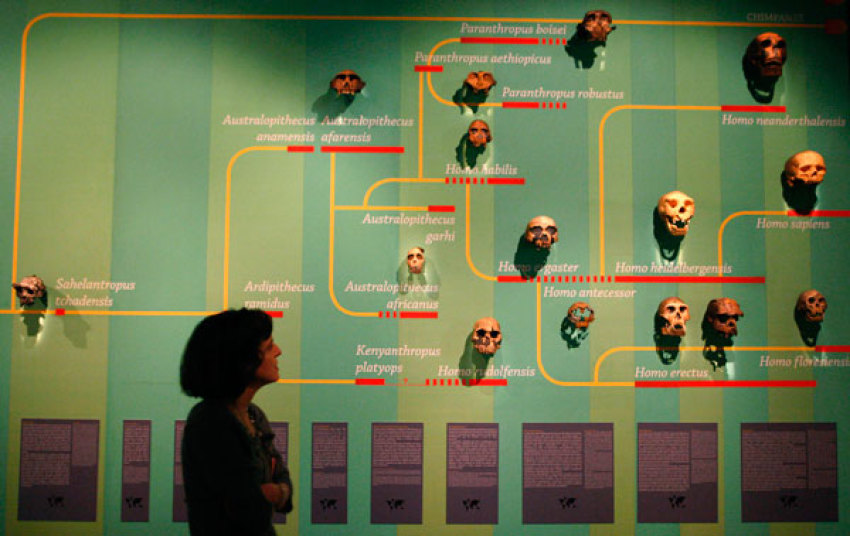What should we believe about creation and evolution?

It may surprise you to know that 90 percent of all the scientists who have ever lived are alive right now.
Around 400 BC, Hippocrates pioneered the belief that physical diseases have natural causes and looked for their solutions, not in the pagan religions of the day, but in approaches that birthed the “science” of medicine.
But the Western world would wait nearly twenty centuries for Leonardo da Vinci and Nicolaus Copernicus to break significant new ground in scientific investigation. Francis Bacon (died 1626) and his laws of investigation are considered by many to herald the beginning of what is now known as the “scientific movement.”
As a result, the “scientific” worldview did not exist when the Christian movement began. We may feel a scientific need to know what happened to the dinosaurs, but those in the biblical era did not. No conflict between science and faith was possible.
To the contrary, Christianity did more to prepare for the later scientific revolution than any other religious worldview.
In the first century, conventional wisdom was highly mythological and superstitious. No one would think to investigate the makeup of water, for instance, because the gods could change its composition tomorrow. The science we call geography was risky, as we don’t want to anger the deities responsible for their respective land areas. The gospel was incredibly good news that the world is created and ordered by a benevolent God.
Greek rationalism and Christian confidence in an ordered creation would eventually make the scientific movement possible.
In the medieval era, the Church dominated the progress of knowledge, arguing for an earth-centered view of the universe that made the Church central. We are all familiar with the tragic rejection of Galileo’s theories that followed. Under Newton’s influence, “scientists” began to see the universe as a machine governed by laws of mechanistic causality. God was no longer needed to explain the laws of physical experience. When Darwin pioneered evolutionary theory, a Creator became unnecessary for explaining the origins of life as we know it. The result was a heightened dualism between science and faith, reason and religion.
Fortunately, dynamics within the science/faith relationship have changed dramatically in recent generations.
Einstein’s theories of relativity showed the universe to be far less mechanistic and predictable than Newton thought. Problems with Darwin’s assumptions made atheistic evolution less tenable.
And Christians have increasingly accepted the fact that the Bible was not intended to be a science textbook. While we believe that God’s word speaks with authority and truth to every subject it addresses, we also know that it was not written to define the age of the earth or size of the universe.
It tells us what we need to know to follow Jesus, not all we would like to know about the world he created. So long as scientific declarations do not contradict intentional biblical truth, there can be no conflict between the two.
All truth is indeed God’s truth.
A biblical approach to creation
Let’s apply this mindset to the question of creation. What did the biblical authors actually tell us about our origins?
First, God created all that is (Genesis 1:1) and pronounced it good (v. 31).
Second, he created life in the sea and birds in the air (Genesis 1:20-21), living creatures on land (v. 24) and mankind in his image to “rule” all the life he created (v. 26).
Third, God created the universe in six “days,” the Hebrew word for a defined period of time. These were not necessarily twenty-four-hour days marked by sunrise and sunset.
In fact, while “there was evening, and there was morning” each “day,” God didn’t create the sun and the moon until the fourth “day.” Some of the ancient rabbis thought Genesis meant that God created the universe in six literal days; others believed he created in six acts with undetermined periods of time between them; still others argued that he created in six “eons” or “ages.” Genesis doesn’t specify, because the answer is of no practical significance to our lives.
When did he create the universe?
Again, Genesis doesn’t say.
If I could tell you precisely how old the universe is, would such information change your life today?
However, some have told us more than the Bible says. For instance, in the 1650s, an Irish archbishop named James Ussher added up the biblical genealogies and decided that God made the world in the year 4004 BC. His dating system was printed in the margin of the first Scofield Study Bible (published in 1909) so that generations of Bible students believed the Bible “teaches” that the world is six thousand years old.
While current geological estimates place our planet at 4.5 billion years of age, “young earth” theorists, influenced by biblical genealogies and other interpretations, aren’t so sure.
Some use “Flood Geology” to claim that the pressures caused by Noah’s flood made the earth appear far older than it is. Others claim that God created the universe six to ten millennia ago but made the world to appear older than it is. Still others argue for a “gap” between Genesis 1:1 (when God first made the universe) and verse 2 (when he remade it, presumably after Satan’s “fall,” a few millennia ago).
None of these theories are necessitated by the biblical data.
What should we believe about creation? That God did it.
How long ago? In how many days? Apparently we don’t need to know, or we would. His word tells us all that is essential for living in his will.
Where it is silent, it is best if we take the hint.
What about evolution?
Several pejoratives are popular these days.
“Liberal,” for instance, means, by definition, to be tolerant or generous. But, in Christian theology, it usually depreciates a person’s belief in biblical authority or lack thereof.
“Secular” means to be connected with the world. Given that God called his creation “very good” (Genesis 1:31), this shouldn’t be a bad thing. But it is.
And “evolutionist,” from a word meaning to develop, has itself evolved to the top (or bottom) of things not to be.
Why is this? Why does the subject matter?
Evolutionary problems
Charles Darwin’s evolutionary principles are really very simple:
- Creatures procreate more offspring than can survive.
- This offspring possesses enormous variety.
- There is a struggle for existence due to overpopulation.
- Because of their variety, some of the offspring are more fit for survival than others.
- These capacities for survival become naturally selected and inherited.
As an example, a hundred years ago there were small-winged moths and large-winged moths in England. The small-winged moths couldn’t fly above the pollution generated by the factories of the day, so they died out. The large-winged moths could and survived. Today, there are only large-winged moths in England.
Here we find “microevolution” at work: adaptation within a biological set, genus, or species. People are taller and less hairy than they used to be. Horses are larger; most dogs are smaller. Nothing in the Bible teaches that God didn’t make the world so that it would adapt to its changing environment.
The difficulty arises when Darwin’s principles are applied across biblical categories, from apes to people, fish to birds, and so on. This is called “macroevolution.” And it leads to problems, both with the evidence and with Scripture.
The fossil record contains no so-called “missing links” from one biblical category to another. The old Neanderthal Man, Piltdown Man, and so on are no longer representative of the best theories. Darwin said the fossil record would demonstrate increasingly simple organisms as we move backward in time, but it does not.
Paleontological evidence shows us adaptation within biblical categories, but not across them. Advocates for macroevolution now posit “spontaneous mutatory jumps” across the biblical categories but without empirical evidence for their assumptions. Such a theory is, of course, contrary to the clear record of Genesis. The biblical accounts of creation are not written as myths or legends or symbols but as a straightforward narrative.
It is clear that both macroevolution and biblical creationism are built on faith principles. I believe that both God’s revelation and the best empirical evidence confirm the fact that God created life as Genesis says he did. He made birds, and fish, and us.
You didn’t happen to be
So know this: you are here on purpose.
You are not an accident or the coincidence of random chaos. God made you, intentionally, for a reason.
You are the greatest miracle you know. Your body consists of 206 bones, wrapped with 650 muscles and seven miles of nerve fibers. Your eyes possess one hundred million receptors and your ears twenty-four thousand fibers. Your heart beats thirty-six million times every year and sends blood pumping through more than sixty thousand miles of veins, arteries, and tubing.
Your brain contains thirteen billion nerve cells. Picture the possible number of interconnections in your brain this way: the number of atoms in the universe is one followed by one hundred zeroes. The number of different patterns possible in your brain is one followed by over eight hundred zeros. And your unconscious brain database, that which your unconscious brain knows and stores, outweighs your conscious brain on an order exceeding ten million to one.
You literally cannot imagine how remarkable you are.
Now, glance at the matter and energy God has made.
Imagine a wall with hundreds of dials. Each must be at exactly the right setting for carbon-based life to emerge in a suburb of the Milky Way. If the cosmic expansion of the universe had first been a fraction less, it would have imploded billions of years ago; a fraction more intense and galaxies could not have formed.
The odds of our universe’s existence and design occurring by random chance would not be accepted by any gambler anywhere on earth.
Picture a comet. Its vapor trail can be more than ten thousand miles long. But capture and bottle that “tail” and you discover that the amount of vapor actually present in your bottle is less than one cubic inch of space.
Imagine traveling across the sky at the speed of light. You would fly for 4.5 billion years to reach the edges of the universe we can see through telescopes today. Yet the Bible says that God measures all of that with the palm of his hand (Isaiah 40:12).
The creation reveals a remarkable Creator.
Conclusion
President Theodore Roosevelt and his good friend, the naturalist William Beebe, would on occasion stay at Roosevelt’s family home. They would go out on its lawn at night. They would search the skies until they found the faint spot of light behind the lower lefthand corner of the Great Square of Pegasus. Then they would remember together the words:
That is the Spiral Galaxy in Andromeda.
It is as large as our Milky Way.
It is one of a hundred million galaxies.
It consists of one hundred billion suns,
Each larger than our sun.
Then President Roosevelt would grin at Mr. Beebe and say, “Now I think we are small enough. Let’s go to bed.”
Are we small enough to go to God?
Originally posted at Denison Forum.



























